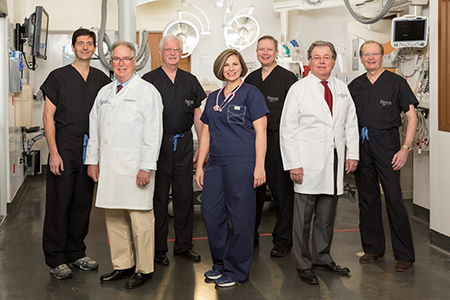
Baylor University Medical Center at Dallas is among the first in the U.S. to conduct a new clinical trial that will implant wombs in 10 women with absolute uterine factor infertility, meaning their uterus is nonfunctioning or nonexistent. The hope is to give these women a chance to become pregnant and carry a child full term.
"We strongly believe in this clinical trial and its potential to change lives," said Goran Klintmalm, MD, PhD, FACS, chief and chairman of Baylor Annette C. and Harold C. Simmons Transplant Institute at Baylor University Medical Center.
The researchers, who will conduct the clinical trial through Baylor Scott & White Research Institute, anticipate that the first baby to be carried by a transplanted womb in the U.S. could be born in 2017. The complex process involves a multi-disciplinary collaboration at Baylor University Medical Center among obstetrician-gynecologists (ob-gyns), fertility specialists, as well as the transplant team.
"The entire process of transplantation, fertilization, prenatal care and delivery—they're all connected as part of this study, and they'll all take place at Baylor University Medical Center at Dallas," said Giuliano Testa, MD, principal investigator and surgical chief of abdominal transplantation at Baylor University Medical Center. "All of these components are integrated with one goal in mind: helping women who've been previously unable to have a baby."
A similar trial in Sweden for women with absolute uterine factor infertility, which is typically caused by a birth defect or prior medical treatments, has resulted in seven successful womb transplants and five live births. In 2014, a 36-year-old Swedish participant in that trial became the first woman in the world to give birth to a baby via a donated uterus.
The Swedish study took place after more than a decade of lab research that showed promising results for this procedure. Dr. Testa and his team will apply the insights of those outcomes to this study, with special input from the researchers involved in the initial effort at Sahlgrenska University Hospital in Gothenburg, Sweden.
"They were the pioneers for this," said Dr. Testa. "The Swedish researchers have paved the way to make this possible, and we're going to build on that."
Donors, Recipients and the Womb Transplant Procedure
Transplanted wombs can come from both living and deceased donors of all adult ages, even post-menopausal women. For this study, researchers at Baylor University Medical Center plan to include both types of donors.
Investigators in this trial will seek recipients between ages 20 and 35 years old with absolute uterine factor infertility, intact ovaries, and the desire to carry a baby to term, among other criteria. Living donors should be between 40 and 65 years old and have previously carried at least one baby to term, among other criteria (menopause is not required). The final patient pool of recipients will total 10, with Baylor University Medical Center's first womb transplant surgery expected in 2016.
Prior to the surgery, study participants will undergo in-vitro fertilization (IVF), which is possible because qualified patients must have healthy and otherwise normal functioning ovaries. In-vitro fertilization uses reproductive technology to retrieve eggs from the ovaries and fertilize with sperm from the subjects male partner in a lab.
After surgery, the women will be monitored and may be eligible for an embryo produced from the earlier IVF procedures to be transferred as early as a year following the womb transplant. If implantation is successful and the recipient becomes pregnant, she will be routinely monitored until her baby is delivered by cesarean section. While the transplant procedure could offer a new option for many infertile women who want to carry their own baby, researchers stress that it's not designed as a permanent organ donation. Because carrying foreign body tissue can increase infection risk and requires taking regular anti-rejection medication, women in this study will undergo a hysterectomy after one or two successful pregnancies. For this reason, the women who want a second pregnancy will have shorter windows of time between births.
"Because this surgery is not a lifesaving transplant like a liver or kidney, there's no need for the patients to take the anti-rejection medications once they've achieved their goal, which is to have a baby," Dr. Testa said, adding that if there is no pregnancy, the women will still need to have a hysterectomy.
Potential to Impact Thousands
It's estimated that of the 62 million women in the U.S. who are of reproductive age, about 15.4 percent of them may have absolute uterine factor infertility – meaning that expansion of this study could benefit thousands of women who hope to carry their own biological children. If 2017 brings babies successfully born from transplanted wombs, those new options for women hoping to bear children may come by the end of the decade, or sooner.
"If we're as successful as we believe we'll be in helping women have full-term healthy pregnancies with the transplantations, then we will open this option to every woman who is willing to undergo a transplant to have a child," Dr. Testa said.
To learn more about this study, including eligibility requirements, call 1-800-4BAYLOR or visit BaylorHealth.com/WombTransplant.
# # #
About Baylor Scott & White Health
As the largest not-for-profit health system in the state of Texas, Baylor Scott & White promotes the health and well-being of every individual, family and community it serves. It is committed to making quality care more accessible, convenient and affordable through its integrated delivery network, which includes the Baylor Scott & White Health Plan, Baylor Scott & White Research Institute, the Baylor Scott & White Quality Alliance and its leading digital health platform – MyBSWHealth. Through 51 hospitals and more than 1,200 access points, including flagship academic medical centers in Dallas, Fort Worth and Temple, the system offers the full continuum of care, from primary to award-winning specialty care. Founded as a Christian ministry of healing more than a century ago, Baylor Scott & White today serves more than three million Texans. For more information, visit: BSWHealth.com

